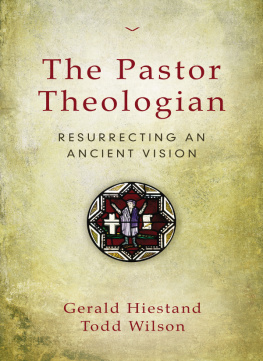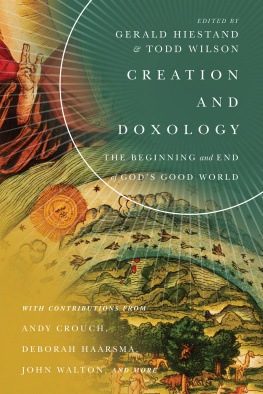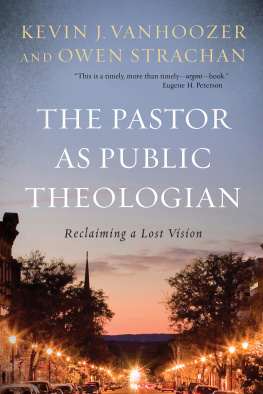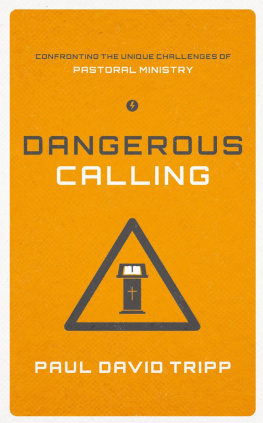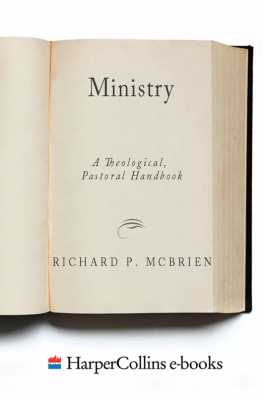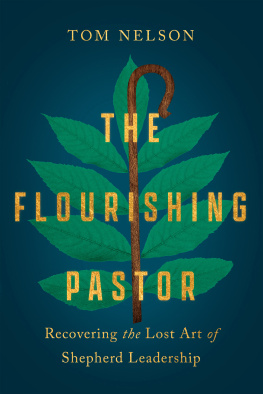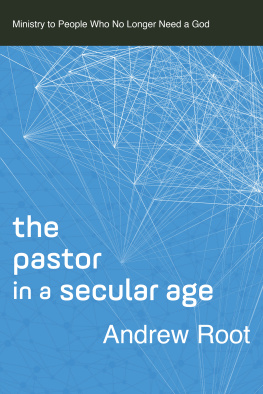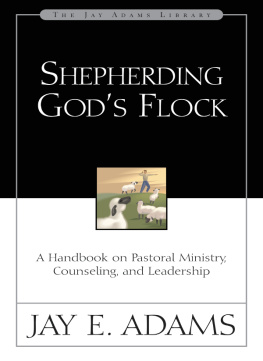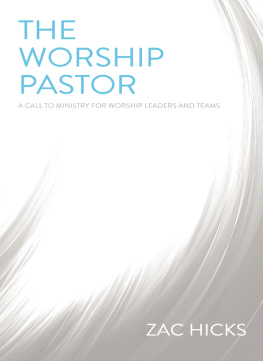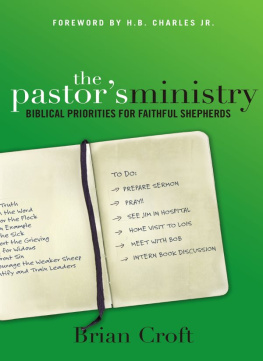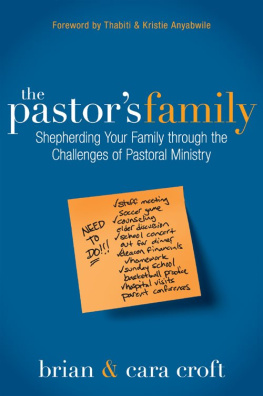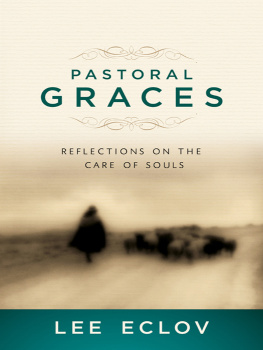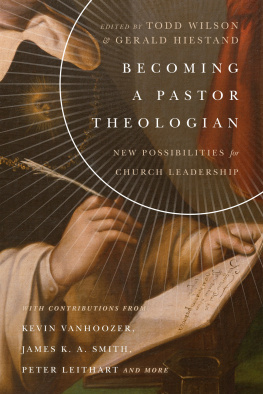
What an exciting and timely book! Gerald Hiestand and Todd Wilson not only make a compelling case for reviving a distinguished tradition of pastor-theologian thought leaders. They also point the way for how this kind of leadershipmuch needed today!can address the very new conditions in which the present day churches are called by God to minister.
Richard Mouw
Academically trained pastors, like engineers or lawyers, may struggle to navigate between a vocation and passion as scholars on the one hand and as practitioners on the other. Of course, not all are called to be both. But Hiestand and Wilson challenge their North American evangelical readership to confront a double problem of anemiain their churches theology and in the theological academys understanding of the church. All those alert to the tension are here invited to a practically minded vision of the pastor as ecclesial theologian, called to feed his or her people with the life-giving gospel as transforming nourishment for heart and mind.
Markus Bockmuehl, professor, Keble College, University of Oxford
In an age of leadership drawn from business management and results measured solely in numbers, it is wonderfully refreshing to find a clarion call for the return of the pastor theologian. Of course, our authors know that Paul not only thought and wrote, but planted churches and preached but most of the temptations in our age, far from turning us into thinkers abstracted from people, sound the siren call of mere activism. This book, rightly absorbed, will improve our preaching and help our churches mature, not so much as ends in themselves but as the by-product of loving God with our minds.
D. A. Carson
The PastorTheologian may be a small book, but it is an ambitious one. Gerald Hiestand and Todd Wilson summon the church to return to a time when pastors were theologians and theologians pastors, when pastors served as intellectual shepherds of the church. The renewal of what they call ecclesial theology will provide a needed transfusion into theologically anemic pastoral ministry and pastorally anemic theology.
Peter Leithart, President, Theopolis Institute, Birmingham, Alabama
Most of the best theologians in the history of the church worked as pastors. But sadly, this is not true today. Most pastors now spend the bulk of their time on mundane issues, leaving intellectual ministry to specialists in the academy who all too often work in a way that is lost on the laity. This is a tragedy indeed. Who is feeding Gods people solid theological food (Hebrews 5:12 14)? Kudos to Pastors Hiestand and Wilson for focusing on this problem, and for recommending practical steps that all of us can take in our churches and our schools to find a better way forward, helping Christians come to know the Lord we say we love so much.
Douglas A. Sweeney, St. Mark Lutheran Church, Lindenhurst, Ill., Trinity Evangelical Divinity School, Deerfield, Ill.
Authors Gerald Hiestand and Todd Wilson demonstrate that the overarching need of todays church is theologians who wear the clerical mantle who work and write as those who bear the weight of souls upon their shoulders. The case that they present is winsome and utterly convincing, as they trace the history of the rise and demise of the pastor-theologian, and the resulting theological and ethical anemia of the church. But more, they provide us with a nuanced profile of the ecclesial theologian and a reasoned way forward. The PastorTheologian is an exhilarating and heartening book and a must-read for the church and the academy where it will produce lively, ministry-changing discussion!
R. Kent Hughes, Senior Pastor Emeritus of College Church, Wheaton, Ill.
Context matters. A pastor who daily faces the challenges and possibilities involved in leading his or her congregation may see things differently than, and develop insights different from, an academic who faces the challenges of classroom teaching and specialized research. Hiestand and Wilson here argue, accordingly, that a revival of pastorally situated theology may provide resources for the renewal for theology and church alike. The result is a clear, compelling vision, clearly and compellingly stated. A welcome book!
Kevin W. Hector, Assistant Professor of Theology and of the Philosophy of Religions, The University of Chicago Divinity School
If youre looking for canaries in the churchs coal mines, consider our seminaries and divinity schools. In some cases, the seminary has simply become one more outpost of the academy, hijacked by the ideals of the research university, almost allergic to pastoral formation. In other cases, the seminary is reduced to a management seminar where the pastorate is confused with technique. The PastorTheologian is an antidote to both, a vision for ecclesial theology and a theological ecclesia. We need this book because we need pastor theologians.
James K. A. Smith, Calvin College, author of Desiring the Kingdom and editor of Comment magazine
Hiestand and Wilson shine a spotlight on a seismic fault whose damage to the church has been under the radar: the great divorce between the pastoral ministry and academic theology. They argue compellingly that a healthy church body needs red blood (pastoral energy) and gray brain cells (theological intelligence) to grow into Christian maturity. This is a book written in faith the kind of faith that moves institutional mountains and raises, if not the dead, then at least defunct concepts like the pastor theologian.
Kevin J. Vanhoozer, Research Professor of Systematic Theology, Trinity Evangelical Divinity School
This book is a timely reminder and challenge that pastors, not professors, are the theological leaders of the church. This book is informed by centuries of church history as well as by Scripture and by insightful analysis of the state of the church today. A must-read for anyone seeking guidance on how to bridgeor rather, destroythe pastor-theologian divide.
Simon Gathercole, Senior Lecturer in New Testament Studies, Fitzwilliam College, University of Cambridge
Hiestand and Wilson call pastors and academics to embrace the highest goal for their work: the building up of Christs body, the church. Their assertion that pastors must have a high level of devotion to Christ, theology, and pastoral work is much needed today, an era in which many churches are dying for lack of knowledge of God and his ways.
Paul House, Professor of Divinity, Beeson Divinity School
Here is a clarion call, not for pastors to take theology more seriously, but to become theologians themselves, ecclesial theologians, whose vocation, as pastors, is to traffic in ideas and to provide a thought leadership which are not only biblically based, historically informed, theologically potent, intellectually credible, and culturally relevant, but also, and above all, church-born-and-bred, like the vision set forth in the book itself. Here then is a manifesto to overcome the anemia caused by the disastrous division of labor between church and academy, in which there is an insufficient amount of ecclesial substance to our theology and theological substance to our churches. Take up and read!
Scott Hafemann, Reader in New Testament, Director of Taught Postgraduate Studieam St. Marys College, University of St Andrews
ZONDERVAN
The Pastor Theologian
Copyright 2015 by Gerald Hiestand and Todd Wilson
ePub Edition May 2015: 978-0-310-51699-6
Requests for information should be addressed to:
Next page
